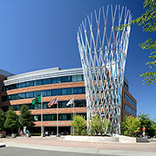Everyone's experience is different after cellular immunotherapy. So, we get many types of questions — and we often hear similar questions from people in similar situations. Below are the most frequently asked questions from patients and families.
If you have questions after getting cellular immunotherapy at Fred Hutch Cancer Center, you can call the Cellular Immunotherapy Long-Term Follow-Up (LTFU) Program by phone at 206.667.5811 or email imtxltfu@fredhutch.org
FDA Requirements After Treatment
The FDA said that its previous requirements and recommendations — known as risk evaluation and mitigation strategies (REMS) — were no longer needed. REMS are meant to help make sure the benefits of a therapy are greater than the risks.
At Fred Hutch, we continue to recommend staying within 30 minutes of the Sloan Clinic for at least four weeks to be monitored by our cellular immunotherapy experts. Based on how you are doing, your care team will advise you on how long to avoid driving. It may be as little as two weeks or possibly longer. Patients should still be monitored for 15 years to check for any long-term concerns.
Our Cellular Immunotherapy Long-Term Follow-Up team stays up to date on the latest requirements and recommendations. In fact, our research led to the change about driving. We’re here to guide you and the rest of your health care team on what’s needed after treatment.
Cytokine Release Syndrome (CRS) and Neurotoxicity
Neurotoxicity refers to side effects that affect the brain or nerves. If you have neurotoxicity, you may experience symptoms such as confusion, difficulty speaking, tremors, headaches, mood changes, unsteadiness or seizures.
CRS and neurotoxicity may cause life-threatening side effects. It is important to have a caregiver with you who can watch for side effects and help you get care if needed. Learn about what to do at home and when to call the clinic, after-hours clinic or 911 for help: Cellular Immunotherapy Cytokine Release Syndrome (CRS) and Neurotoxicity.
Cytomegalovirus (CMV) Testing
CMV is a virus in the herpes family and is very common. CMV infections are rarely serious in people who are healthy otherwise. The virus usually lies dormant (inactive) in the body. But it can be “reactivated” and cause serious illness in people who have weakened immune systems. If you have been treated for cytokine release syndrome or neurotoxicity, you are at increased risk for CMV reactivation.
CMV testing is usually done weekly for the four weeks after your last dose of corticosteroids. The oncologist on your cancer care team will do this after you are discharged from the Bezos Family Immunotherapy Clinic at Fred Hutch.
If you have a positive test, please let us know as soon as possible. Call the Cellular Immunotherapy LTFU Program at 206.667.5811 or email us at imtxltfu@fredhutch.org. We will work with you and your oncologist to decide if you need treatment or more testing.
Learn more: Cytomegalovirus (CMV) Testing – Immunotherapy Clinic
Discharge from the Hospital
When it’s time for you to leave the hospital after getting cellular immunotherapy, we’ll help you and your caregiver be ready. A member of Fred Hutch’s Transition Services team will meet with you and your caregiver. Our goal is to prepare you for your transition to outpatient care at the Bezos Family Immunotherapy Clinic at Fred Hutch.
Your Transition Services team member will go over these topics with you:
- Caregiver skills checklist
- Clinic expectations, day of discharge and typical clinic schedule
- Source of oral medications
- Medication mediset/bringing your medication list to clinic visits
- Food safety
- Line care plan
- Monitoring for fevers, chills and sepsis
- Quick reference guide, emergency cards and 24-hour phone numbers
- Coping at home
- Plans for caregiver self-care and relaxation
- Function of home care/intravenous (IV) infusion services
- Long-term follow-up specific to your treatment
- Infection control in the home
- Home equipment and fall prevention
Learn more: Hospital Discharge Guidelines - Immunotherapy Transition
We’ll help you make a smooth transition from the Immunotherapy Clinic back to care with your referring physician. Your Immunotherapy Clinic care team will meet with you to discuss:
- Transferring care to your referring physician
- Long-term follow-up, including how to reach the LTFU team
- Managing care at home, like how to prevent infections and manage symptoms
We recommend seeing your referring physician within one week of being discharged from the Immunotherapy Clinic. We’ll give you information to share with them, and we’ll send them a letter and discharge summary.
Learn more:
Vaccines
If you had CAR T-cell therapy, we recommend getting vaccinated against certain diseases, such as childhood diseases, influenza and pneumococcal pneumonia, after treatment. Ask your LTFU care team for a list of vaccines you will need.
If you were vaccinated before your CAR T-cell therapy, you may lose your immunity to the diseases you were vaccinated against. More research needs to be done to be sure. CAR T-cell patients may keep some of their immunity, but it is generally not enough to prevent infection.
Check our vaccination handout for ideas about how to find the recommended vaccines in your community.
Learn more: Summary: Vaccination Guidelines After B-Cell and Plasma Cell Targeted CAR T Cell (Patients)
Share with your health care providers: Summary: Vaccination Guidelines After B-Cell and Plasma Cell Targeted CAR T Cell (Providers)
Cellular Immunotherapy LTFU Contact Information
You and your health care providers can contact the LTFU team with questions or concerns about your health after cellular immunotherapy. Call us by phone at 206.667.5811 or email us at imtxltfu@fredhutch.org.
The LTFU team is made up of Fred Hutch physicians, advanced practice providers, nurses and researchers. We work with your local team to resolve any medical problems you might have and to gather information for research so we can keep improving care.
Learn more: Immunotherapy Clinic LTFU Contact Information for Patients

Contact Cellular Immunotherapy LTFU
Hours: Monday–Friday, 8 a.m.–4 p.m.
Mailing Address:
Fred Hutch Cancer Center
ATTN: IMTX LTFU
1100 Fairview Ave. N
Mail Stop M2-A876
Seattle, WA 98109
